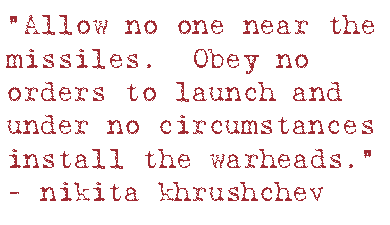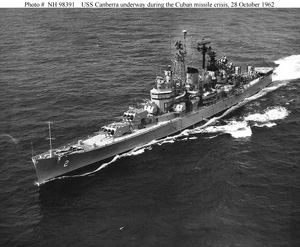Sunday, 28 October 1962
At 5:00 p.m. Moscow time (9:00 a.m. in Washington)104 Chairman Khrushchev broadcast his response over Radio Moscow.105 In his response, he confirmed that he had issued orders to cease work on the sites and “to dismantle the arms which you described as offensive, and to crate and return them to the Soviet Union.” He appealed to President Kennedy not  to support actions against Cuba and indicated that he would trust Kennedy’s 27 October pledge not to attack or invade Cuba or to support other countries in attacking Cuba. He reminded Kennedy of the dangers of reconnaissance over flights and indicated that, out of his concern for Russians in Cuba, “that violation of Cuban airspace by American planes could also lead to dangerous consequences. And if you do not want this to happen, it would be better if no cause is given for a dangerous situation to arise."106
to support actions against Cuba and indicated that he would trust Kennedy’s 27 October pledge not to attack or invade Cuba or to support other countries in attacking Cuba. He reminded Kennedy of the dangers of reconnaissance over flights and indicated that, out of his concern for Russians in Cuba, “that violation of Cuban airspace by American planes could also lead to dangerous consequences. And if you do not want this to happen, it would be better if no cause is given for a dangerous situation to arise."106
Khrushchev again used the Radio Moscow option to quickly relay his decision to the United States. Khrushchev was determined not to go to war over Cuba and he was convinced that the United States was prepared to go to war. He had to get the message of resolution through quickly. As the events of the 27th confirmed, there were too many opportunities for a mistake that could result in war. The decision not to go to war would do no good if it did not get to its recipient in time to resolve the crisis.
At the same time, Khrushchev asked Castro to refrain from provoking the Americans by continuing to shoot at their aircraft.  Khrushchev said, “Therefore, I would like to advise you in a friendly manner to show patience, firmness and even more firmness.” He couched this request in terms that portray the settlement of the crisis in Cuba’s favor “creating a guarantee against the invasion of Cuba.”107
Khrushchev said, “Therefore, I would like to advise you in a friendly manner to show patience, firmness and even more firmness.” He couched this request in terms that portray the settlement of the crisis in Cuba’s favor “creating a guarantee against the invasion of Cuba.”107
Khrushchev also forwarded a copy of the letter to Kennedy to U Thant with the information that Deputy Foreign Minister Kuznetsov would be leaving for the United Nations to coordinate the Soviet negotiations.108
At 5:03 p.m. in Washington (1:03 a.m., 29 October in Moscow) President Kennedy responded to Chairman Khrushchev welcoming the Chairman’s letter and expressing hope “that the necessary measures can at once be taken through the United Nations… so that the United States in turn can remove the quarantine measures now in effect.” Kennedy continued to express his desire to use this momentum to explore disarmament.
U Thant, for his part, welcomed the apparent resolution to the crisis and informed Khrushchev that he accepted Castro’s invitation to go to Cuba in the hopes that “at the present time such a visit could contribute to the peaceful solution of the problem.” He also indicated he would discuss “modalities of verification by the United Nations” with both Kuznetzov and Castro.109
Prime Minister Castro responded to U Thant and to the United Nations with a five point proposal declaring that Kennedy’s guarantees are “ineffective” unless the economic blockade is stopped, subversive activities are stopped, “piratical attacks” are stopped, airspace violations are stopped, and Guantanamo is abandoned by the United States and returned to Cuba.
110 Castro’s effort tried to leverage the crisis for Cuba’s gain, this time adding a demand for the American’s to abandon Guantanamo.
Castro also replied to Khrushchev and defended his actions to secure Cuban airspace and clearly stated his position on UN inspections: “I also wish to inform you that we are in principle opposed to an inspection of our territory.”111
Secretary Rusk spoke to Latin American and OAS Ambassadors at 5:00 p.m. in Washington to update them on the situation. Rusk recounted the 26, 27, and 28 October letters from Khrushchev and highlighted that the United States rejected the notion of a Turkey for Cuba trade. He confirmed the decision not to “base any policy on Castro’s broadcast today of five points,” that the “US remains cautious”. Rusk reaffirmed the United States’ commitment to the OAS and hemispheric defense, and he delicately indicated that the assurance made by Kennedy not to invade Cuba “does not (rpt not) (sic) mean we [are] guaranteeing [the] Castro regime.” Rusk confirmed that the quarantine would not end until verification had been completed and that the next steps lay with the acting Secretary General of the UN.112
General Pliyev had received his clear orders revoking the authority to fire the weapons with permission from Moscow. His new orders left nothing to chance, “Allow no one near the missiles. Obey no orders to launch and under no circumstances install the warheads.”113 The Soviet military forces were standing down.
At 11:35 a.m. the Joint Chiefs sent a telegram to the State Department indicating their knee-jerk reaction to the message from Moscow. In their message, “the JCS are of the opinion that this may be an insincere proposal to gain time. Hence, there should be no relaxation of alert procedures.”114
At 1:54 p.m., however, the State Department received information that as of 12:20 p.m. the Joint Chiefs issued an order that “no forceful action or boarding of any… ships until further orders.”115
That evening, Scali met with Feklisov, “who reported, ‘I am under instructions to thank you. The information you provided Chairman Khrushchev was most helpful to him in making up his mind quickly. And that includes your explosion of Saturday.’”116

